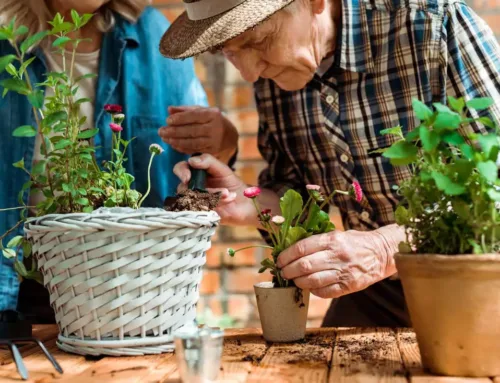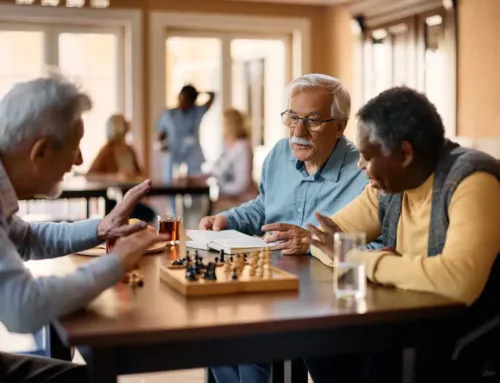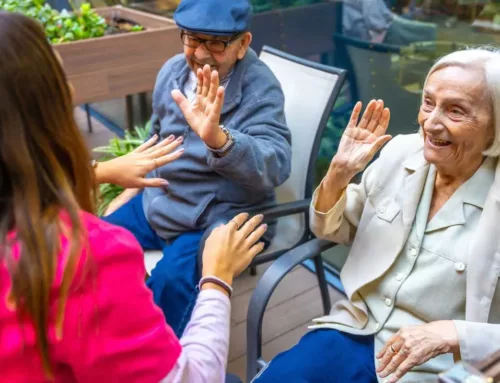
If you’ve ever researched senior care for an aging parent or loved one, you will have likely encountered the phrase ‘activities of daily living’, or ADLs. But what exactly constitutes an activity of daily living, and why are they so vital? Essentially, ‘activities of daily living’ is an umbrella term encompassing all the basic, integral tasks a person must do each day to live a happy, healthy, and fulfilling life.
Some examples of activities of daily living include:
- Bathing or showering
- Using the bathroom
- Cooking and eating
- Getting dressed
- Moving around the home
- Brushing teeth and hair
- Getting in and out of bed
How do Activities of Daily Living Influence Quality of Life?
As a person ages, it’s not unusual for activities of daily living to become a little more challenging. Unfortunately, as these tasks lay the foundations for good mental and physical health, this can have a huge impact on a senior’s overall quality of life. Reduced ability to carry out activities of daily living may ultimately start a ‘domino effect’ influencing many important areas of a senior’s life indirectly.
For example, if an individual is incontinent or no longer able to take showers due to declining mobility, they could become more vulnerable to skin infections or feel less confident going out to socialize. Or if a senior is unable to get to the grocery store, they may experience malnutrition or resort to eating foods that are spoiled. This could then impact on their energy levels, making other tasks more difficult, too.
Since activities of daily living are so vital in maintaining good health, assessing your loved one’s ability to carry out these tasks can be a great way to decide whether it’s time to explore residential assisted living in AZ. Let’s take a look at just a few ways in which professional caregiver support with activities of daily living can improve quality of life for seniors.
Improved Nutrition
Getting adequate nutrition is often challenging for seniors, who have a very specific set of dietary needs. Many residential assisted living facilities in Tucson serve three meals per day and regular snacks for residents to enjoy, free from the burden that grocery shopping and food preparation can become.
With rich food conveniently available to fuel their body and mind daily, seniors are granted the time and energy to enjoy the hobbies, activities and social life they love. What’s more, menus are usually developed by dieticians and culinary teams who understand the unique nutritional requirements of aging seniors.
Maintenance of Personal Hygiene
Reduced ability to keep up with personal hygiene is often a particularly difficult aspect of aging. Not only are seniors who are unable to shower or use the bathroom independently more vulnerable to physical illness and infections, but as we’ve already touched upon, they may also lose the confidence to socialize or venture outside of their home.
Personal hygiene truly affects every facet of life, and senior care providers know this. With professional caregiver support on hand 24/7 to offer dignified personal care, residential assisted living facilities can help seniors live comfortably, confidently and free from worry or embarrassment.
Increased Mobility and Independence
Enhancing mobility is absolutely vital in maintaining quality of life for aging seniors. Most activities of daily living require some level of mobility, whether it be transferring to and from bed, using the bathroom, bathing or even eating. With caregiver support, seniors are able to stay as mobile as possible, allowing them to complete activities of daily living with greater ease and independence. What’s more, residential assisted living facilities are well-adapted to support the use of valuable mobility aids.
But improving mobility isn’t the only way a focus on activities of daily living can increase a senior’s ability to stay independent. When daily tasks become challenging, it inevitably takes a toll on both mental and physical health. For example, if a senior is not getting the right nutrition, they may feel weak and lethargic, and if they’re also expending huge amounts of energy just to get to the bathroom, they might feel emotionally drained, too.
The possibility of accepting help with activities of daily living is often initially difficult for seniors, and it’s common to fear a loss of independence. On the contrary, caregiver support can actually increase energy, physical strength and confidence, allowing them to carry out tasks even more independently than before. Professional caregivers can deliver just the right amount of assistance to help seniors practice activities of daily living as independently as possible, while also feeling adequately empowered and supported.
Prevention of new Injuries and Illnesses
Being able to carry out activities of daily living effectively with caregiver support can go a long way in keeping a senior happy and healthy. For instance, seniors who struggle to maintain personal hygiene may become vulnerable to urinary tract infections (UTIs), and those with reduced mobility might be at a greater risk of injury from falls.
Therefore, residential assisted living facilities know that a senior’s ability to function well and carry out activities of daily living is equally as vital as taking care of any pre-existing health conditions. When your loved one moves to a senior care facility, activities of daily living should be thoroughly assessed and prioritized within their care plan.
To find out more about how Saguaro Ranch residential assisted living facility supports residents with activities of daily living to improve their quality of life, get in touch today or arrange a tour.




